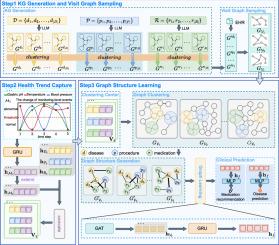StructCare: Dynamic graph structure learning for enhancing context-aware healthcare
IF 7.5
1区 计算机科学
Q1 COMPUTER SCIENCE, ARTIFICIAL INTELLIGENCE
引用次数: 0
Abstract
The advancement of intelligent healthcare systems has generated large-scale electronic health records (EHRs). This data provides a foundation for advancing machine learning in healthcare, particularly for pivotal tasks like disease prediction and medication recommendation. Despite the growing focus on modeling relationships within EHR, most existing methods treat medical events as connected by static relationships, where associations are defined by co-occurrence or fixed correlations. However, such approaches overlook dynamic relationships that reflect how a patient’s health status and treatment evolve over time. Therefore, we propose StructCare, a clustering-based graph structure learning framework that explicitly models these dynamic relationships by integrating lab test results with medical events. Specifically, StructCare leverages large language models to construct relationships among medical events and generate personalized patient graphs from visit records. It then employs temporal networks to capture evolving health trends from monitoring-level events and dynamically updates the graph structure at each visit, generating richer patient representations, thereby improving the accuracy of disease prediction and medication recommendation. Extensive experiments on two real-world datasets and across two tasks show that StructCare consistently outperforms state-of-the-art methods. Specifically, it achieves an average improvement of approximately 2.1 % in F1-score and 2.8 % in Jaccard for disease prediction, and 2.3 % in F1-score and 4.0 % in Jaccard for medication recommendation, highlighting its effectiveness in capturing dynamic, context-aware relationships.

StructCare:用于增强上下文感知医疗保健的动态图结构学习
智能医疗保健系统的进步产生了大规模的电子健康记录(EHRs)。这些数据为推进医疗保健领域的机器学习奠定了基础,特别是在疾病预测和药物推荐等关键任务方面。尽管人们越来越关注电子病历中的关系建模,但大多数现有方法将医疗事件视为通过静态关系连接起来的,其中关联是通过共发生或固定相关性定义的。然而,这种方法忽略了反映患者健康状况和治疗如何随时间演变的动态关系。因此,我们提出了StructCare,这是一个基于聚类的图结构学习框架,通过将实验室测试结果与医疗事件集成,显式地对这些动态关系建模。具体来说,StructCare利用大型语言模型来构建医疗事件之间的关系,并从访问记录中生成个性化的患者图表。然后,它利用时间网络从监测级事件中捕捉不断变化的健康趋势,并在每次就诊时动态更新图结构,生成更丰富的患者表示,从而提高疾病预测和药物推荐的准确性。在两个真实世界数据集和两个任务上进行的广泛实验表明,StructCare始终优于最先进的方法。具体来说,它在疾病预测方面的f1评分和Jaccard评分的平均提高约2.1%,在药物推荐方面的f1评分和Jaccard评分的平均提高约2.3%和4.0%,突出了其在捕捉动态、情境感知关系方面的有效性。
本文章由计算机程序翻译,如有差异,请以英文原文为准。
求助全文
约1分钟内获得全文
求助全文
来源期刊

Expert Systems with Applications
工程技术-工程:电子与电气
CiteScore
13.80
自引率
10.60%
发文量
2045
审稿时长
8.7 months
期刊介绍:
Expert Systems With Applications is an international journal dedicated to the exchange of information on expert and intelligent systems used globally in industry, government, and universities. The journal emphasizes original papers covering the design, development, testing, implementation, and management of these systems, offering practical guidelines. It spans various sectors such as finance, engineering, marketing, law, project management, information management, medicine, and more. The journal also welcomes papers on multi-agent systems, knowledge management, neural networks, knowledge discovery, data mining, and other related areas, excluding applications to military/defense systems.
 求助内容:
求助内容: 应助结果提醒方式:
应助结果提醒方式:


